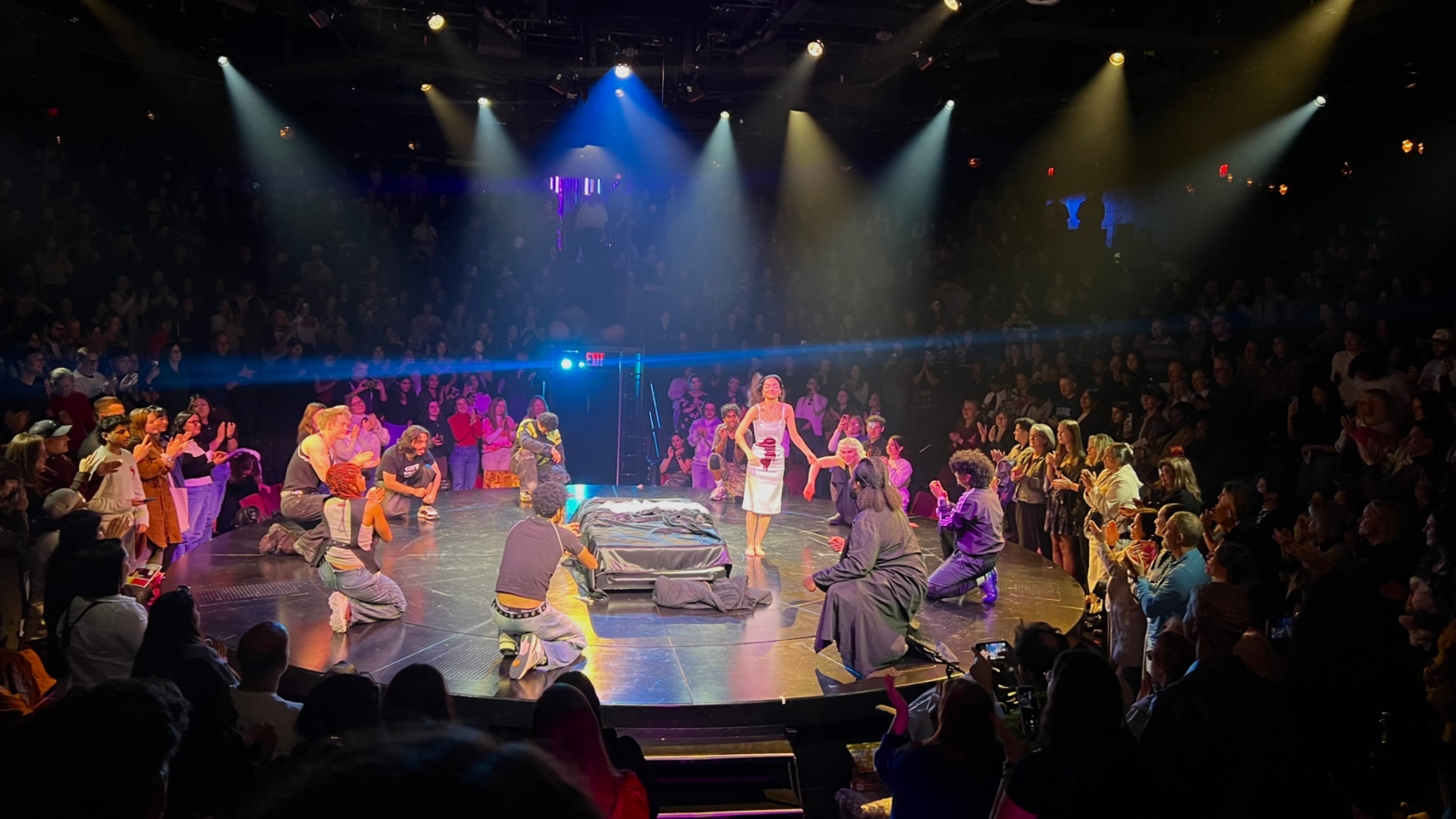Romeo and Juliet may be centuries old, but Sam Gold’s revival starring Rachel Zegler and Kit Connor pulses with a heartbeat that’s unmistakably 2024. Between the club-style LED lighting, inflatable furniture, care-bear pajamas, and vaping on stage, this adaptation was the antithesis of Shakespeare’s graceful sonnets. Yet, in the most inexplicable way, it works.
Romeo + Juliet is currently in previews and set to officially open on Oct. 24. At the Circle in the Square Theatre, Verona unfolds on a circular stage, blurring the line between cast and audience. The space is used to its fullest potential — overhead runways reveal a bed that moves up and down, and actors weave through the aisles stopping to share a glance or a line with the audience. Two platforms flank the stage, adorned with large teddy bears (teddy bears were having a moment in this production), where actors climb ladders to deliver their monologues from a furry mountaintop, casting their words out like confessions. There’s hardly a bad seat in the house. Even if Shakespeare’s language loses you for a moment, your attention snaps back when actors are suddenly beside you.
Connor and Zegler’s performances as Romeo and Juliet respectively feel reckless, young, and foolishly passionate, just as Shakespeare intended. Connor breathes a youthful naivety and playful charm into Romeo, proving that even Shakespearean language can be boyish and impulsive. Meanwhile, Zegler’s Juliet radiates a mix of wide-eyed optimism and the all-consuming excitement of first love, her expressions veering from puppy dog eyes to determined defiance.
The production embraced casting multiples — nearly every actor, except for Romeo and Juliet, juggled two or three roles. Some transitions were cleverly done, with a quick change of a vest or a jacket, but others left the audience a bit puzzled — as if searching for a clue in a Shakespearean escape room. There were standouts: Gabby Beans’ (Mercutio / Friar / Prince) character shifts are always crystal clear. If anyone’s confused, she makes sure they aren’t for long — at one point, she paused mid-speech with a smirk for the audience, to announce, “I am now the Friar.” Her performance strikes a delicate balance between humor and intensity, and her delivery of the famous “plague on both your houses” echoed through the theater with a force that demanded attention and reflection.
Another standout was Gian Perez, who alternated between Samson, Paris, and Peter; he stole scenes with his comedic timing and impromptu musical moments, all while sporting a “gift from god” T-shirt. His humor is the offbeat accent that makes this Verona feel less like a relic and more like a playground — or maybe a rave, depending on the scene.
Amidst these dynamic portrayals, the soundtrack works subtly to amplify the emotions that linger in each scene. Written by Jack Antonoff, the music feels like a Taylor Swift-inspired ode to youthful heartache — appropriately suited to this story of teenage obsession and rebellious love. Zegler’s voice, though underused, soared in the moments she did sing, and left the audience wanting more. In a cheeky nod to Antonoff’s past, Gian Perez as Paris quips at the DJ, “If you don’t play ‘We Are Young’, I will fucking fight you.” Cue a 20-second singalong with the crowd — unexpected, but welcome.
The experience felt less like a traditional theater production and more like a lively gathering of friends reveling in the story that was first introduced to them in their middle school English classes. It’s a production that feels keenly aware of Baz Luhrmann’s 1996 film adaptation but steps confidently into its groove. The infectious energy permeates every moment, including the audience in the linguistic adventure rather than leaving them in their seats as passive observers. The play is wrapped in the youthful nature of love and loss, which young watchers wait to experience, and older audience members look back on with all-knowing grins. It turns out the chaotic journey of growing up remains as relevant in 2024 as it was in the 16th century.








Leave a Reply